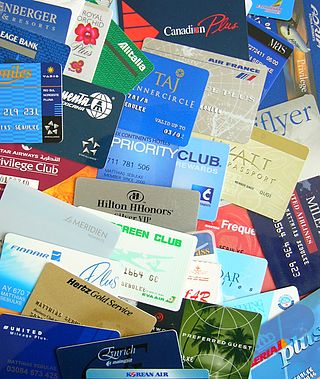Benefit(s) may refer to:
Benefit(s) may refer to:

A loyalty program or a rewards program is a marketing strategy designed to encourage customers to continue to shop at or use the services of one or more businesses associated with the program.
Western may refer to:
Link or Links may refer to:
Stamp or Stamps or Stamping may refer to:

A frequent-flyer programme (FFP) is a loyalty program offered by an airline.
EA is an initialism for Electronic Arts, an American video game company.
Kohl may refer to:
A beacon is an intentionally conspicuous device designed to attract attention to a specific location.
Welfare capitalism is capitalism that includes social welfare policies and/or the practice of businesses providing welfare services to their employees. Welfare capitalism in this second sense, or industrial paternalism, was centered on industries that employed skilled labor and peaked in the mid-20th century.
Gac or GAC may refer to:
Reclaim, reclaimed, reclaimer, reclaiming or reclamation means "to get something back".
Reward may refer to:
Gain or GAIN may refer to:
UHC may refer to:

The Medicare for All Act, also known as the Expanded and Improved Medicare for All Act or United States National Health Care Act, is a bill first introduced in the United States House of Representatives by Representative John Conyers (D-MI) in 2003, with 38 co-sponsors. In 2019, the original 16-year-old proposal was renumbered, and Pramila Jayapal (D-WA) introduced a broadly similar, but more detailed, bill, HR 1384, in the 116th Congress. As of November 3, 2019, it had 116 co-sponsors still in the House at the time, or 49.8% of House Democrats.
Loyalty marketing is a marketing strategy in which a company focuses on growing and retaining existing customers through incentives. Branding, product marketing, and loyalty marketing all form part of the customer proposition – the subjective assessment by the customer of whether to purchase a brand or not based on the integrated combination of the value they receive from each of these marketing disciplines.
Nyx is the personification of the night in Greek mythology.
An incentive program is a formal scheme used to promote or encourage specific actions or behavior by a specific group of people during a defined period of time. Incentive programs are particularly used in business management to motivate employees and in sales to attract and retain customers. Scientific literature also refers to this concept as pay for performance.
Protection is any measure taken to guard a thing against damage caused by outside forces.
Max Factor is a line of cosmetics from Coty, Inc.